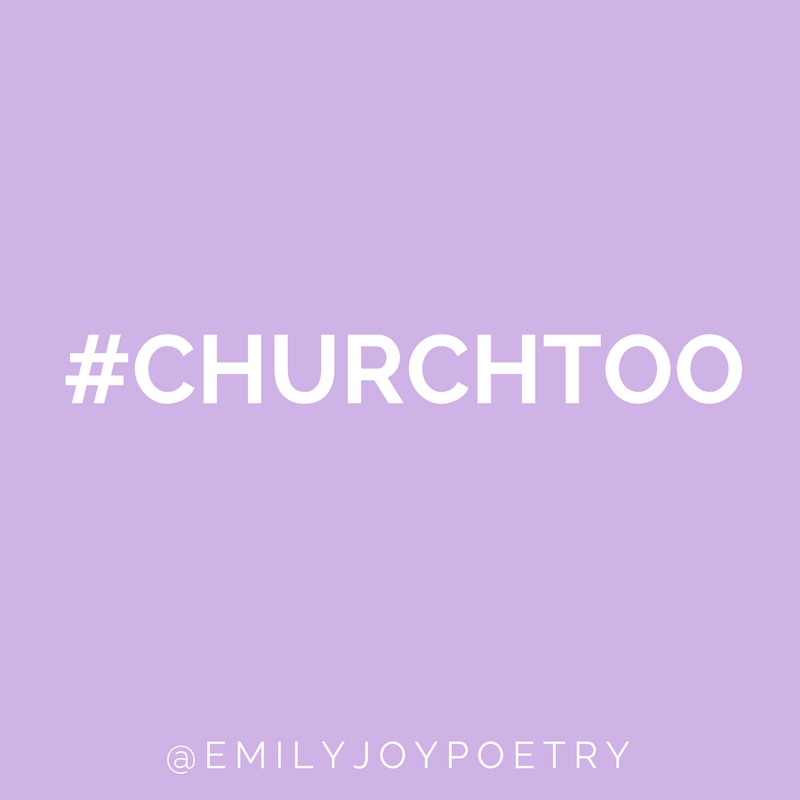Unless you’ve been living under a rock in the past week, you’ve probably seen #ChurchToo trending on social media. A week ago, I took to Twitter to share a story of grooming and abuse I experienced at a church ten years ago that I have never shared publicly. After I shared my story, several other women began to share theirs as well, and my best friend and co-conspirator Hannah Paasch texted me to say that we should come up with a way to continue this conversation with other victims of abuse in the church. I suggested a hashtag to virtually compile the stories and conversations, and after we batted a few ideas back and forth we settled on #ChurchToo—a nod to the extremely popular #MeToo movement, first conceived of by black activist Tarana Burke a decade ago and recently blowing up all over social media in the wake of sex abuse allegations in both Hollywood and Washington. Our thought process was that we wanted to emphasize the fact that these things happen in Church, Too—and based on our own experiences growing up in the church are often covered up or sometimes even rewarded by those in power.
We had no idea how far #ChurchToo would spread. By the next morning there were thousands of tweets on the hashtag, and our notifications and messages were impossible to keep up with. Victims from all over the country and all over the world were coming forward, detailing harrowing stories of sexual harrassment, assault and abuse in the church, some of them even naming names. By Wednesday we were on TIME, Bustle, Vox, Ebony, and a dozen other sites. Our inboxes were filling up with messages of support as well as stories of abuse that people didn’t feel comfortable sharing publicly yet. It’s still pretty hard to keep up with all the notifications several days later (so if you’ve sent me a message or an email in the last few days and I haven’t responded, I promise I’ll get to it soon!).
I say all of this to give you a backstory on the #ChurchToo movement and to say a few other things:
1. If you need a place to tell your story or receive solidarity from other victims, #ChurchToo is there.
2. No one has to tell their story. You don’t owe it to the world or to anyone else. If you are a victim of harassment, assault or abuse, enduring what you endured makes you strong enough. Stay away from the hashtag if you need to for self-care: there’s a lot of rough stuff on there.
3. I believe you. You are loved and heard and affirmed.
4. Pastors, youth pastors, volunteers, lay leaders, small group leaders, Sunday school teachers, youth camp employees, Christian school teachers, if you are even REMOTELY connected to the church: read these stories, pay attention, and come to terms with the fact that Christians are out here committing these kinds of atrocities. Resist the urge to say things like “not all churches do x” or “no true Christian would do x.”
5. At the root of #ChurchToo stories are patriarchy, male leadership coupled with female submission, purity culture, evangelical personality cult culture, lack of sex-positive and medically accurate sex education, homophobia, and white supremacy. Commit to dismantling these things and addressing these root causes in your faith community today.
6. Predatory men should be shaking in their boots. Victims are naming names and the moment is now.
Thanks for being on this wild journey with me. You have no idea how much I appreciate each and every one of you. If you’re new here, hi and welcome. If you’ve been around for a while, thanks for growing with me. Love y’all. Let’s change the world in our corner of it today.
-Emily Joy
P.S. If you found me through #ChurchToo and want to keep up with all the other things I do, like my spoken word poetry, yoga teaching, or other writing, sign up for my mailing list below! As a bonus for signing up, you’ll also get my free Guide to Bi-Inclusive Ministry:


3 thoughts on “#ChurchToo”
Comments are closed.